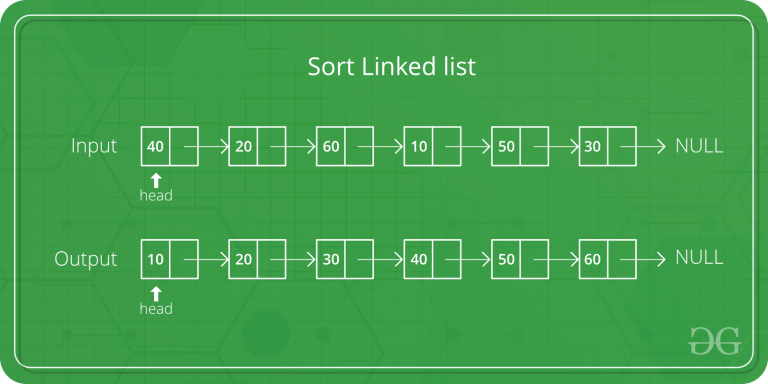C Program for Merge Sort for Linked Lists
Last Updated :
22 Mar, 2023
Merge sort is often preferred for sorting a linked list. The slow random-access performance of a linked list makes some other algorithms (such as quicksort) perform poorly, and others (such as heapsort) completely impossible.

Let the head be the first node of the linked list to be sorted and headRef be the pointer to head. Note that we need a reference to head in MergeSort() as the below implementation changes next links to sort the linked lists (not data at the nodes), so the head node has to be changed if the data at the original head is not the smallest value in the linked list.
MergeSort(headRef)
1) If head is NULL or there is only one element in the Linked List
then return.
2) Else divide the linked list into two halves.
FrontBackSplit(head, &a, &b); /* a and b are two halves */
3) Sort the two halves a and b.
MergeSort(a);
MergeSort(b);
4) Merge the sorted a and b (using SortedMerge() discussed here)
and update the head pointer using headRef.
*headRef = SortedMerge(a, b);
C
#include <stdio.h>
#include <stdlib.h>
struct Node
{
int data;
struct Node* next;
};
struct Node* SortedMerge(struct Node* a,
struct Node* b);
void FrontBackSplit(struct Node* source,
struct Node** frontRef,
struct Node** backRef);
void MergeSort(struct Node** headRef)
{
struct Node* head = *headRef;
struct Node* a;
struct Node* b;
if ((head == NULL) ||
(head->next == NULL))
{
return;
}
FrontBackSplit(head, &a, &b);
MergeSort(&a);
MergeSort(&b);
*headRef = SortedMerge(a, b);
}
struct Node* SortedMerge(struct Node* a,
struct Node* b)
{
struct Node* result = NULL;
if (a == NULL)
return (b);
else if (b == NULL)
return (a);
if (a->data <= b->data)
{
result = a;
result->next =
SortedMerge(a->next, b);
}
else
{
result = b;
result->next = SortedMerge(a, b->next);
}
return (result);
}
void FrontBackSplit(struct Node* source,
struct Node** frontRef,
struct Node** backRef)
{
struct Node* fast;
struct Node* slow;
slow = source;
fast = source->next;
while (fast != NULL)
{
fast = fast->next;
if (fast != NULL)
{
slow = slow->next;
fast = fast->next;
}
}
*frontRef = source;
*backRef = slow->next;
slow->next = NULL;
}
void printList(struct Node* node)
{
while (node != NULL)
{
printf("%d ", node->data);
node = node->next;
}
}
void push(struct Node** head_ref,
int new_data)
{
struct Node* new_node =
(struct Node*)malloc(sizeof(struct Node));
new_node->data = new_data;
new_node->next = (*head_ref);
(*head_ref) = new_node;
}
int main()
{
struct Node* res = NULL;
struct Node* a = NULL;
push(&a, 15);
push(&a, 10);
push(&a, 5);
push(&a, 20);
push(&a, 3);
push(&a, 2);
MergeSort(&a);
printf("Sorted Linked List is: \n");
printList(a);
getchar();
return 0;
}
|
Output:
Sorted Linked List is:
2 3 5 10 15 20
Time Complexity: O(n*log n)
Space Complexity: O(n*log n)
Please refer complete article on Merge Sort for Linked Lists for more details!
Like Article
Suggest improvement
Share your thoughts in the comments
Please Login to comment...